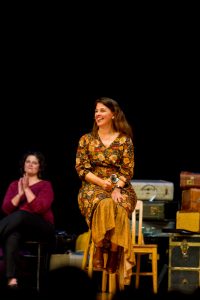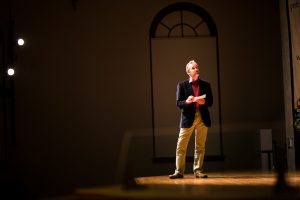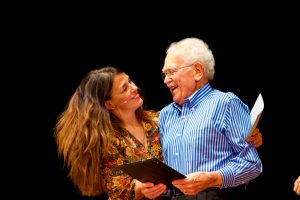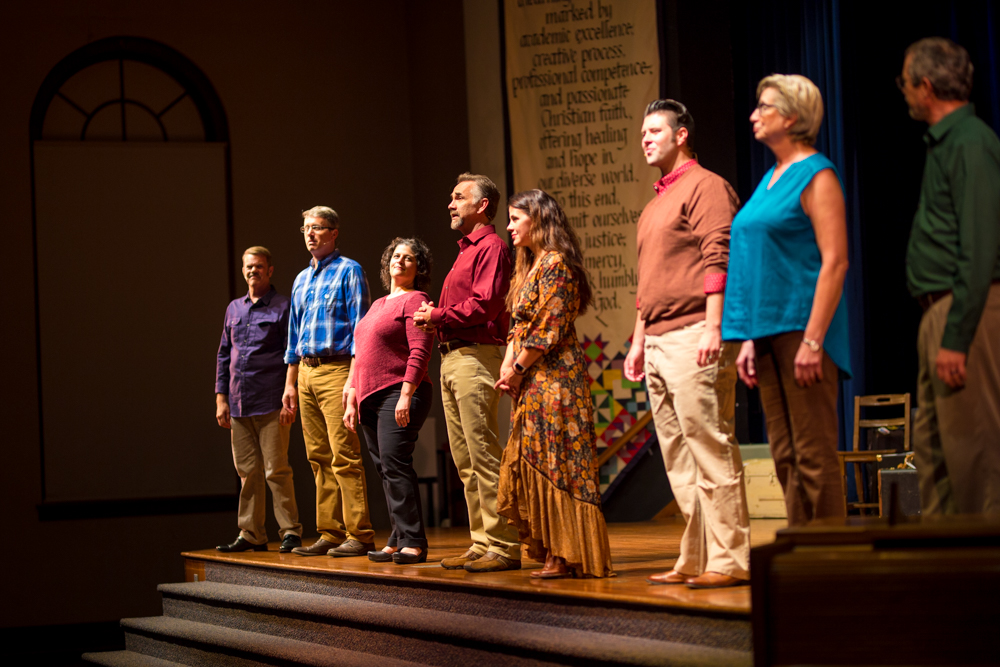They’d wanted audiences to laugh, reflect, feel goosebumps, pause, celebrate and sing — and that’s exactly what happened at the two performances of What we bring. What we take. What we leave. in Lehman Auditorium during Eastern Mennonite University’s Centennial Homecoming and Family Weekend, Oct. 13-15, 2017.
The production, commissioned by EMU’s Centennial Committee and sponsored by Everence Financial, was a collage of stories of the experience of being a student at EMU written by Ingrid DeSanctis ‘88 and Ted Swartz ’89, MACL ’92.

For this production, long-time collaborators Swartz and DeSanctis solicited memories from the EMU community and reflected on their own experiences, which they both say was foundational in their arts pursuits. “We have been keenly aware of how our time at [then] Eastern Mennonite College profoundly shaped our view of the world, life, and art,” program notes stated.
They were joined by six actors: Don Shenk ‘82, of Temple City, California; Helen Stoltzfus ‘78, of Oakland, California; and Trina Trotter Nussbaum ‘00, MA ‘17; Braydon Hoover ‘11; Tim Ruebke ‘93, MA ‘99; and Stan Swartz ‘87, all of the Harrisonburg area.
Special guest appearances featured current students Michaela Mast and Anisa Leonard, musician Trent Wagler ‘02 of the Steel Wheels, and professor emeritus Jay B. Landis ‘54. A choir of Matt Carlson ‘97, MDiv ’16, Katie Derstine ‘05, Les Helmuth ‘78, Matt Hunsberger ‘02, Karen Moshier-Shenk ‘73, Joanna Showalter ‘04, and Michaela Mast and Perry Blosser, both class of 2018, provided background music and interludes.
After watching the 90-minute production, Charlotte Wenger ’11 said that it re-affirmed her gratitude and appreciation for her experience and relationships gained at EMU, and gave her new insight into different eras of EMU’s history.
“The play struck a fantastic balance, with both funny and poignant scenes,” Wenger said. “There was something for everyone to connect with, so particularly during the scenes that covered aspects that weren’t as familiar to me, I loved hearing the responses and reactions of the rest of the audience.”
An early litany titled “The First Time” memorialized college life one line at a time: The first time I walked into Oakwood, and I thought, ‘Oh, no’; The first time that I was homesick and missed the flatlands of Kansas; The first time I thought of justice; The first time I realized what it meant to be Mennonite; The first time I climbed the hill in the dark of night and felt God; and more.
A representation of a committee meeting to draft guidelines for co-ed interactions elicited laughter as administrators expressed shock at prospects that students might “smooch — with vigor” and wrote rules for visitations and double dates.

A “game show” segment featured EMU’s historical events, food, euphemisms and “heroes and heroines,” with the answers full of historical tidbits: the first unsanctioned dance was organized by current provost Fred Kniss ‘79 and Centennial committee chair Louise Hostetter ‘79; a creator of The Piranha, an underground student newspaper, was future president Joe Lapp ‘66.
In another challenge, an off-stage Swartz impersonated the voices of various professors for contestants to identify. For the final impersonation, Swartz’s was replaced with the real voice of Landis, who then came onstage to continue reading lines from Shakespeare, to extended applause.
A group of male characters gleefully shared historic pranks: toilet seats stolen from Northlawn bathrooms and all of Lehman’s benches turned backwards.
Not all scenes were humorous. The actors depicted times of conflict, of painful loss of friends and colleagues, and the institutional struggle inherent in developing from being a place of protection from the world to having its current engaged, global perspective.

In one scene, a student back from a Middle East cross-cultural trip attempted to explain to her father conflicting emotions about the experience. “Do you wish you hadn’t gone?” her father asks. “No,” she says. “I’m glad I went.”
In one jarring juxtaposition, phrases of Micah 6:8 — “Do justice, love mercy and walk humbly with God” — were interjected with tragedies in the years since 1917, such as the Holocaust, the assassinations of President John F. Kennedy and Martin Luther King, Jr., various wars, and mass shootings as recent as Las Vegas this month.
A recurring motif was two people — one struggling with the climb and saying “I didn’t think it would be so hard,” the other exuberant at the view — mounting the hill overlooking campus: a mother and her son, a student enrolled in the school’s first full year, both excited but apprehensive about the start of college life; one student lamenting accreditation and other perceived indications of worldly influence on campus, and another excited about change; one student grappling with no longer wearing a prayer covering but being reminded by another that it’s just cloth; two students grappling with what it means to be peacebuilders after a sleepless night following the attacks of Sept. 11, 2001.
In closing scenes, actors remembered final classes, and the anticipation of graduating, leaving college to work overseas, hoping to return to EMU to teach, and more.

For those of us who were unable to attend this highly acclaimed production (I’ve heard so many wonderful reviews!) — Is there a possible release of a video production? I hope so!!
A video of the play was captured. Plans remain to be finalized for a spring showing on campus and other possible viewing opportunities.
I laughed and I laughed… and I cried. Well done, cast!! It was entertaining and thought provoking!
Is there a chance that the video could be presented in various areas where there are large amounts of alumni? Such as a showing for the Franconia area done at Dock Mennonite Academy. Some of us could not attend the centennial for various reasons.
I’d host a showing in SE Iowa with alumni gathered